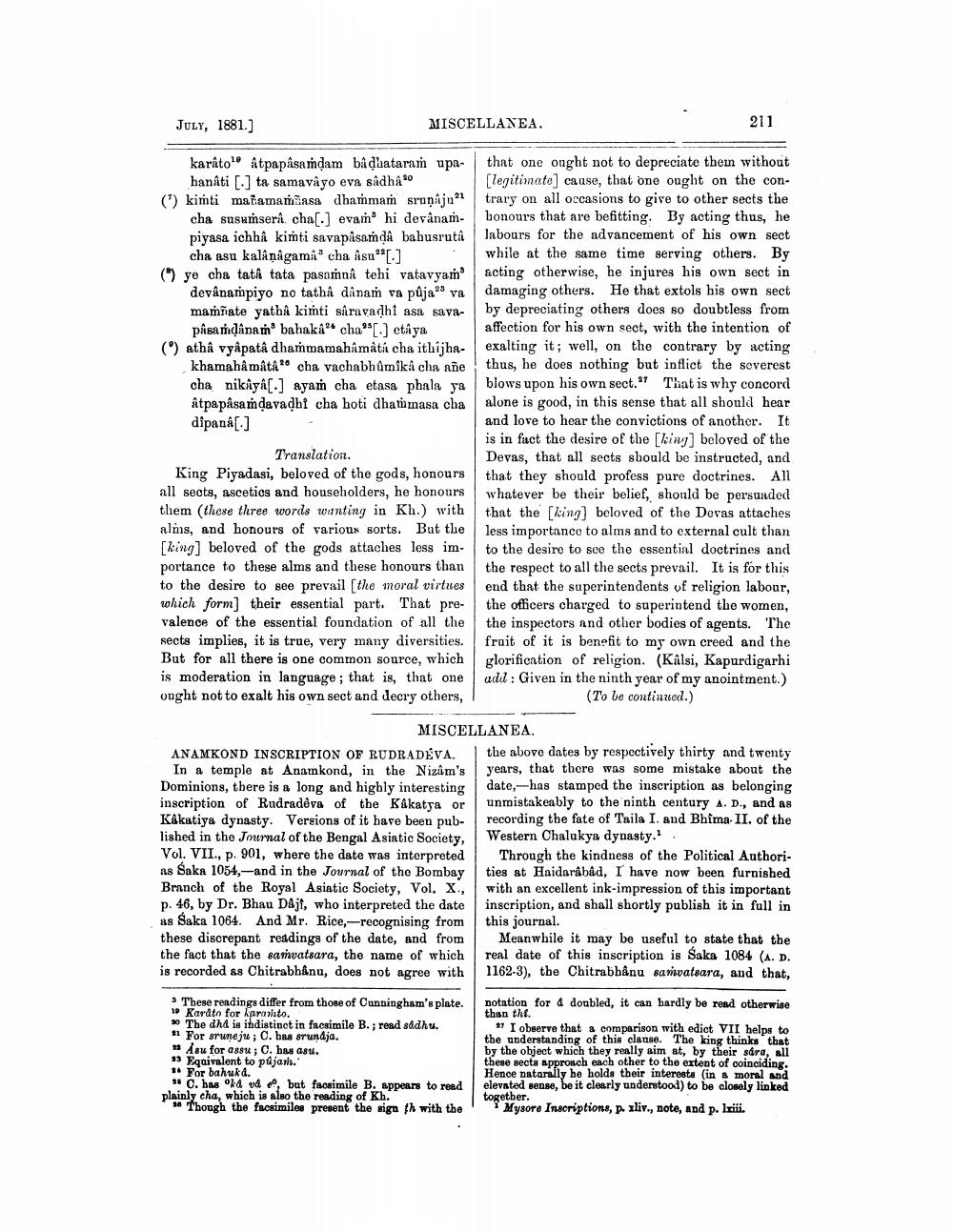________________
JULY, 1881.]
MISCELLANEA.
211
karato. Atpapasamdam bidhataram upa
hanati [.] ta samavâyo eva sådhå *0 ( kimti matamamasa dhammam srunaju21
cha sususera cha[.) evamo hi devânampiyasa ichha kimti savapasamda babusruta
cha asu kalânâgama cha asu”[.] (*) ye cha tatâ tata pasamnâ tehi vatavyam
devânampiyo no tathả dânam va půjaa va mamiate yatha kimti säravadhi asa savapasaridanam bahakao cha"[.) etaya atha vyâpata dhammamahamåtá cha ithijhakhamahâ mâta ' cha vachabhumika cha añe cha nikiya[.] ayam cha etasa phala ya åtpapåsamdavadh cha hoti dhatu masa cha dipanå[.]
Translation. King Piyadasi, beloved of the gods, honours all seats, ascetics and householders, he honours them (these three words wanting in Kh.) with alms, and honours of various sorts. But the [king] beloved of the gods attaches less importance to these alms and these honours than to the desire to see prevail [the moral virtues which form] their essential part. That pre- valence of the essential foundation of all the sects implies, it is true, very many diversities. But for all there is one common source, which is moderation in language; that is, that one ought not to exalt his own sect and decry others,
that one onght not to depreciate them without [legitimato] cause, that one ought on the contrary on all occasions to give to other sects the bonours that are befitting. By acting thus, he labours for the advancement of his own sect while at the same time serving others. By acting otherwise, he injures his own sect in damaging others. He that extols his own sect by depreciating others does so doubtless from affection for his own sect, with the intention of exalting it; well, on the contrary by acting thus, he does nothing but inflict the severest blows upon his own sect. That is why concord alone is good, in this sense that all should hear and love to hear the convictions of another. It is in fact the desire of the [kin] beloved of the Devas, that all sects should be instructed, and that they should profess pure doctrines. All whatever be their belief, should be persuaded that the [ling] beloved of the Dovas attaches less importance to alms and to external cult than to the desire to see the essential doctrines and the respect to all the sects prevail. It is for this end that the superintendents of religion labour, the officers charged to superintend the women, the inspectors and other bodies of agents. The fruit of it is benefit to my own creed and the glorification of religion. (Kalsi, Kapurdigarhi adi: Given in the ninth year of my anointment.)
(To be continued.)
MISCELLANEA. ANAMKOND INSCRIPTION OF RUDRADEVA. the above dates by respectively thirty and twenty
In a temple at Anamkond, in the Nizam's years, that there was some mistake about the Dominions, there is a long and highly interesting date,-has stamped the inscription as belonging inscription of Rudradeva of the Kakatya or unmistakeably to the ninth century A. D., and as KÅkatiya dynasty. Versions of it bave been pub- recording the fate of Toila I. and Bhima II. of the lished in the Journal of the Bengal Asiatic Society, Western Chalukya dynasty.. Vol. VII, p. 901, where the date was interpreted Through the kindness of the Political Authorias Saka 1054,--and in the Journal of the Bombay ties at Haidarâbâd, I have now been furnished Branch of the Royal Asiatic Society, Vol. X., with an excellent ink-impression of this important p. 46, by Dr. Bhau Dajt, who interpreted the date inscription, and shall shortly publish it in full in as Saka 1064. And Mr. Rice, -recognising from this journal. these discrepant readings of the date, and from Meanwhile it may be useful to state that the the fact that the samvatsara, the name of which real date of this inscription is Saka 1084 (A. D. is recorded as Chitrabhanu, does not agree with 1162-3), the Chitrabbânu sanatsara, and that,
3 These readings differ from those of Cunningham's plate. 19 Kardt for kararlato. » The dhd is indistinct in facsimile B.; read sådhu. * For sruneju; C. has srundja. * Asu for assu; C. a asu. 13 Equivalent to pajaris. 1. For bahuka.
** O. has & vde, but facsimile B. appears to read plainly cha, which is also the reading of Kh.
** Though the facsimiles present the sign th with the
notation for 4 doubled, it can hardly be read otherwise than the.
* I observe that a comparison with edict VII helps to the understanding of this clause. The king thinks that by the object which they really aim at, by their sdra, all these secta approuch each other to the extent of coinciding. Hence natarully be holds their interests in moral and elevated sense, be it clearly understool) to be closely linked together.
Mysore Inscriptions, p. xliv., note, and p. lxiii.




